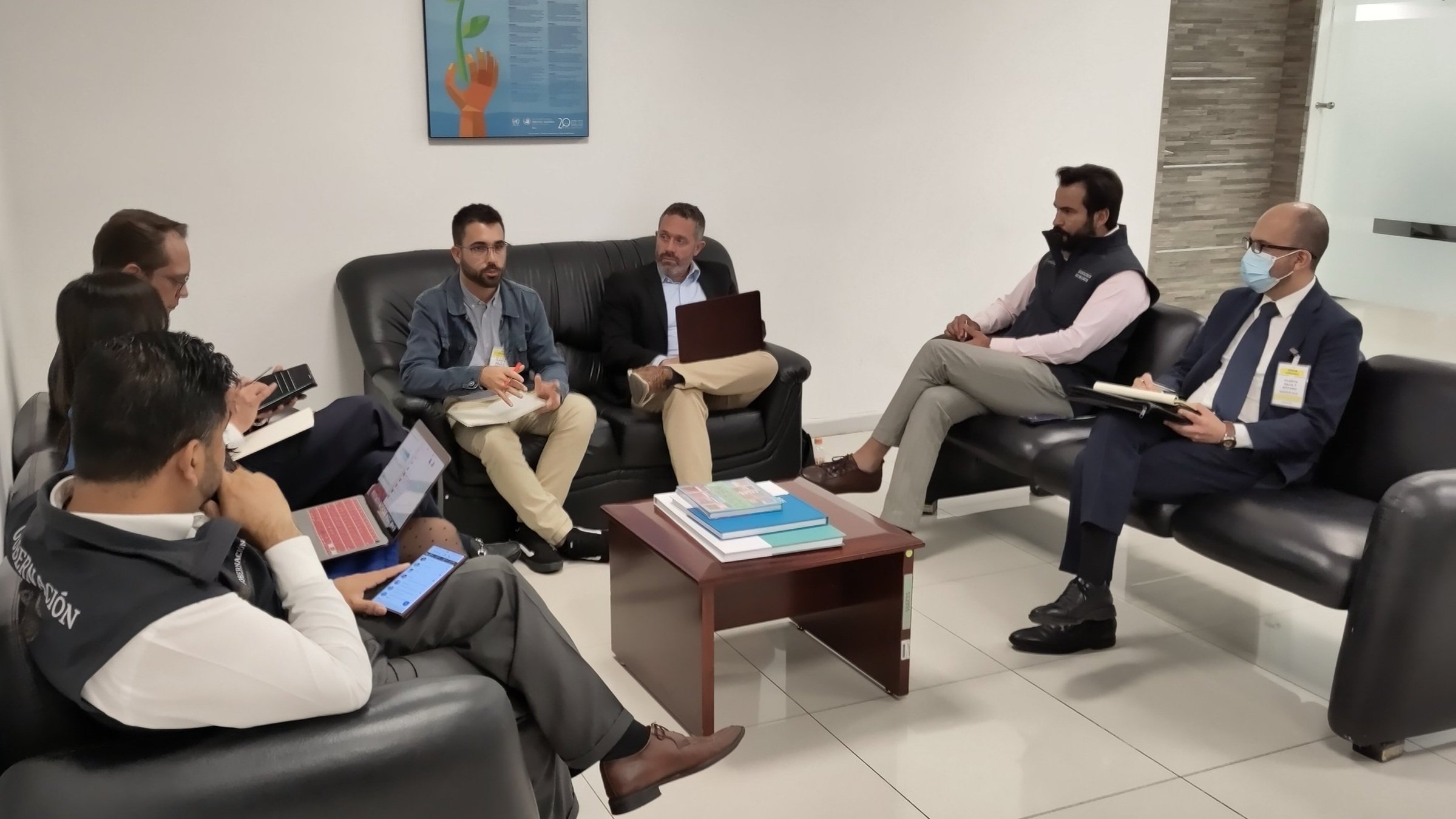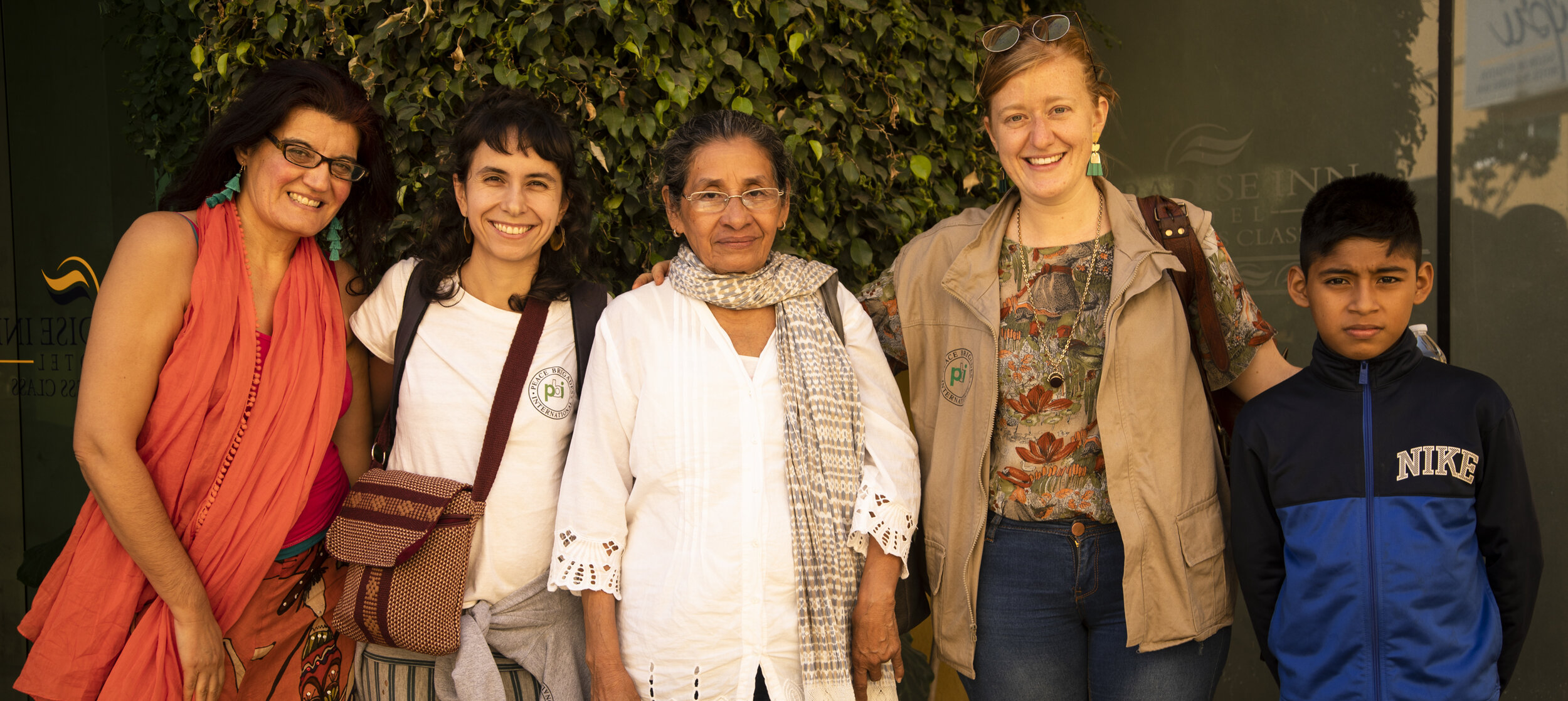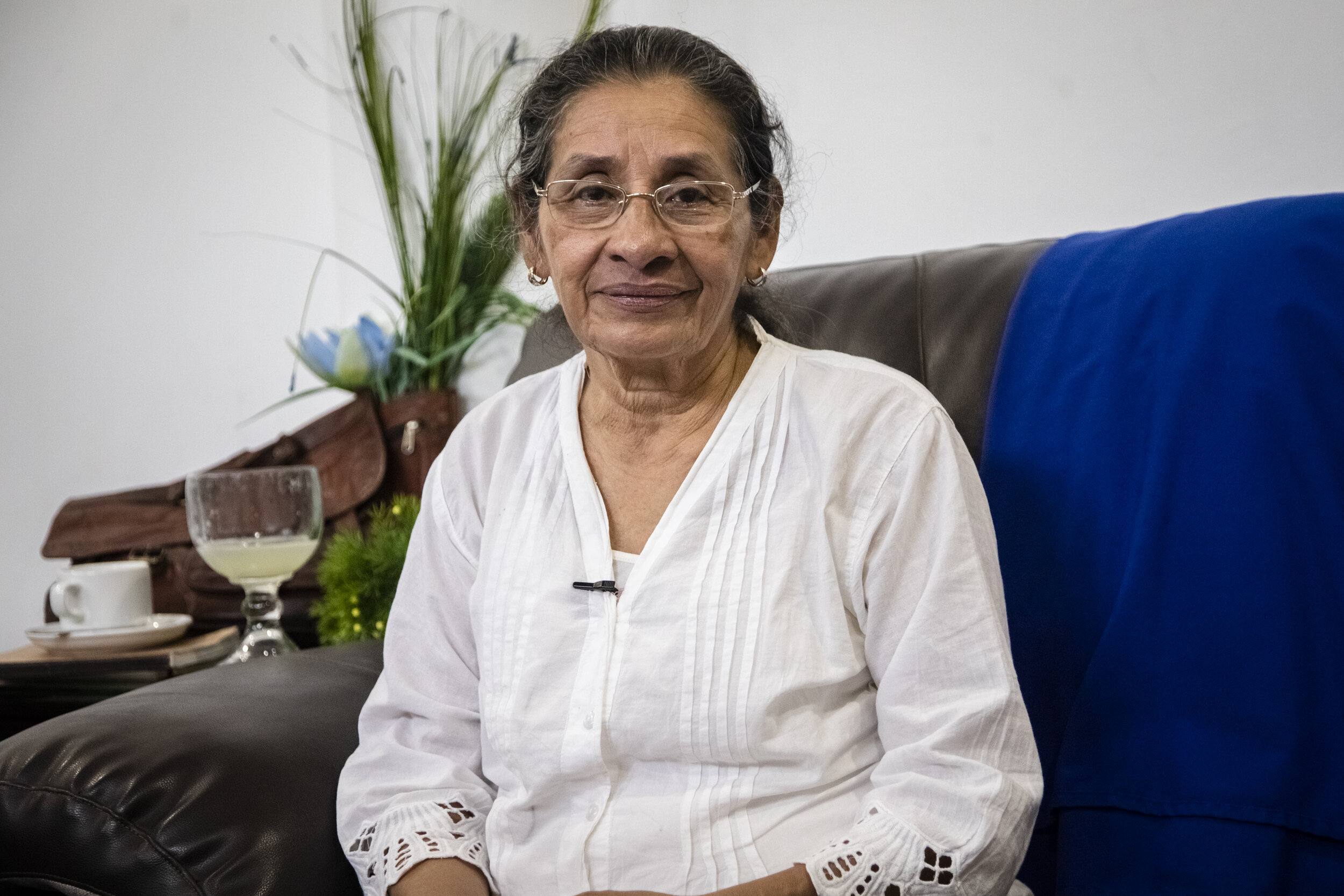
Impunity and the rule of law
Impunity happens in the absence of the Rule of Law.
As a result of impunity, those suspected of criminal acts are not prosecuted or punished and victims are left without effective remedy or compensation for their injuries or loss. At the same time, they – and society – are denied access to the truth about the violations suffered.
We support those campaigning to defend the rule of law so that victims can access the truth about historic injustices. This includes lobbying governments and international bodies on the implementation of binding treaties and conventions, raising the profiles of lawyers through speaker tours across Europe to keep them safe in their own countries, and promoting access to justice in our field projects through targeted capacity building campaigns.

Human rights lawyers
Lawyers challenging those responsible for human rights violations pay an extremely high price - becoming targets of intimidation and repression because of the nature of the cases they take on. They may have their work obstructed, be followed, watched, harassed, subjected to spurious prosecutions, killed or ‘forcibly disappeared’. Many are forced into exile in fear of their lives. In Colombia alone many lawyers are murdered each year, the vast majority with impunity.
Around one in three of the human rights defenders PBI works with are lawyers, and many more provide legal advice and support alongside other work.
PBI UK has created the Alliance for Lawyers at Risk, a network of British lawyers who contribute their time, expertise and political influence to support threatened lawyers accompanied by PBI.
Accompanied lawyers
Colombia
José Alvear Restrepo Lawyers’ Collective (CCAJAR)
Freedom Legal Corporation (CJL)
Luis Carlos Pérez Lawyers’ Collective (CCALCP)
Guatemala
Edgar Pérez Archila and the Human Rights Law Firm
Honduras
Mexico
Alba Cruz and the Integral Defence Committee for Human Rights “Gobixha” (Codigo-DH)
Centre for Human Rights and Legal Advice for Indigenous Peoples (Cedhapi)
Tlachinollan Human Rights Centre
José Alvear Restrepo Lawyers' Collective
The José Alvear Restrepo Lawyers’ Collective (CCAJAR) is recognised nationally and internationally for representing emblematic cases of human rights violations in Colombia, both within the Colombian justice system as well as before the Inter-American System of Human Rights.
Over more than 30 years, the work of CCAJAR’s lawyers has resulted in landmark decisions that have improved access to justice for many more victims of the country’s long-running conflict. The price has been a life under constant threat. Serious security incidents include government officials making statements linking CCAJAR’s lawyers to insurgent organisations, and death squads publicly identifying them as “military targets”.
PBI has accompanied CCAJAR since 1995.
Human Rights Law Firm
The Human Rights Law Firm (BJDH) is an internationally renowned law firm whose lawyers have respresented victims in many emblematic cases of human rights violations in Guatemala.
The work of the BJDH’s lawyers has resulted in landmark decisions that have improved access to justice for many more victims of past and current human rights abuses. The price has been a life under constant threat.
Against a background of entrenched impunity and political violence, The BJDH has achieved some remarkable victories, including in 2009 the first successful case condemning forced disappearance, and in 2011 the conviction of four soldiers for their role in the notorious 1982 Dos Erres massacre, in which more than 250 villagers were murdered in cold blood by a specialist army unit. Their biggest achievement to date was achieving a sentence for genocide in the first ever genocide case to be heard in a Latin American courtroom, against former President Efraín Rios Montt and leading military commanders.
The BJDH work on legal proceedings relating to massacres committed during the internal armed conflict and other cases of past and current human rights violations. Since 2010, we have specifically accompanied lawyers during their work on criminal prosecutions relating to:
• The forced disappearance, torture and extrajudicial execution of Efraín Bámaca Velásquez
• The Dos Erres massacre
• The Río Negro massacre
• The Genocide Case
• The Burning of the Spanish Embassy
• The Panzos massacre
• The Cotzal case
• Creompaz
Alba Cruz and the Integral Defence Committee for Human Rights “Gobixha”
The Integral Defense Committee for Human Rights ‘Gobixha’ (Codigo-DH) is a Mexican civil society organisation that offers legal aid as well as psychological support and medical attention to victims of human rights violations, whilst offering legal support to support their access to justice and fight against impunity.
In 2011, Codigo-DH opened a regional office in San Pedro Amuzgos, which provides the educational and legal advice that contributes to the recognition of and respect for human rights in the region, the awareness and the education of local authorities and the training of human rights advocates. In 2013 Codigo-DH suffered further attacks when it began to support communities from the Isthmus of Tehuantepec who are demanding their right to free, prior and informed consultation to the apparent imposition of a wind farm.
The community human rights defenders in San Dionisio del Mar and Álvaro Obregón have suffered various attacks and threats for their activism in the defense of their lands and territories. PBI is monitoring the security situation and the granting of the right to consultation through its accompaniment to Codigo-DH in the Isthmus.
Alba Cruz is a human rights lawyer and the juridical coordinator of for Codigo-DH in Oaxaca State, one of the poorest and most underdeveloped states in Mexico, with a large, highly marginalised, indigenous population.
PBI’s accompaniment of Alba began when she was working for the November 25 Liberation Committee, following threats against her and her colleagues in 2009. Along with other organisations, the Committee was instrumental in seeking justice for the victims of what has become known as the ‘Oaxaca Case‘. In October 2009, as a result of their efforts, the Mexican Supreme Court ruled that Ulíses Ruiz, Oaxaca’s Governor, and other public officials were responsible for the violation of a range of rights, including the right to life, freedom and physical integrity.
Alba is also the defence lawyer for trade union leader Marcelino Coache. Marcelino was detained illegally and tortured in April 2009 but has still not obtained justice or reparation.
In spite of national and international recognition of her work, Alba continues to be threatened and harassed in connection with the cases she represents. She has been the target of physical and verbal attacks, and her car was tampered with several times.
Tlachinollan Human Rights Centre
Since 1994, the Tlachinollan Human Rights Centre has been defending the fundamental rights of individuals as well as the collective rights of Guerrero’s deprived indigenous communities.
The organisation’s lawyers advise and represent victims of human rights violations and their families and take on emblematic cases that exemplify the structural causes of human rights abuses.
Following an interdisciplinary model of ‘integral defence’, they use legal tools, political and media pressure, and national and international alliances to achieve change.
Among Tlachinollan’s recent cases are those of Inés Fernández Ortega and Valentina Rosendo Cantú, indigenous women who were raped by soldiers in early 2002.
The cases were heard before the Inter-American Court on Human Rights in May 2010. The Court found Mexico had violated the women’s rights and ordered, among other measures, improvements in investigation procedures of rape cases and an end to the application of military justice in cases of human rights abuses committed by soldiers against civilians.
In July 2011, the women’s cases were finally handed over to Mexico’s civilian court system.
Human rights defenders working to defend the rights of indigenous people in Guerrero are routinely threatened and attacked. In 2009, the Inter-American Commission on Human Rights (IACHR) issued emergency protection measures to more than 100 human rights defenders, including Tlachinollan staff.
Despite these measures, threats, aggression and harassment forced Tlachinollan to close its Ayutla office in March 2009. The office was not reopened until June 2011.

Human rights defenders fighting impunity
Many of the human rights defenders (HRDs) PBI accompanies are working within a system where the rule of law is weak. They are particularly vulnerable because their would-be attackers are able to act without fear of punishment.
HRDs who work specifically to counter impunity and promote the rule of law are often subject to aggressive threats and reprisals from those who benefit most from the status quo.
Accompanied defenders challenging impunity
Colombia
Association for Alternative Social Advancement (MINGA)
Association of the Families of the Detained – Disappeared (ASFADDES)
Claudia Duque (journalist)
Freedom Legal Corporation (CJL)
Inter-Church Justice and Peace Commission (CIJP)
Manuel Cepeda Foundation
National Movement of Victims of State Crimes (MOVICE)
Regional Corporation for the Defence of Human Rights (CREDHOS)
Guatemala
The Human Rights Law Firm (BJDH)
Mexico
The “Bartolome Carrasco Briseno” Regional Centre for Human Rights (Barca-DH)
Centre for Human Rights and Legal Advice for Indigenous Peoples (Cedhapi)
The Cerezo Committee
The Integral Defence Committee for Human Rights “Gobixha” (Codigo-DH)
Organisation of the Indigenous Me’Phaa People (OPIM)
Tita Radilla and the Mexican Association of Detained-Disappeared and Victims of Human Rights Abuses (AFADDEM)
The Tlachinollan Human Rights Centre
Claudia Julieta Duque
Investigative journalist Claudia Julieta Duque is a correspondent for the Colombian human rights radio station Radio Nizkor and a former researcher for the José Alvear Restrepo Lawyers' Collective (CCAJAR).
In more than 23 years as a journalist, she has investigated and reported on numerous high-profile cases, including those involving issues of forced disappearance, forced recruitment of children by legal and illegal armed groups, the impact of impunity and the right to justice, and infiltration of paramilitary groups in government agencies.
Claudia began receiving threats in 2001, the year she began working with CCAJAR on an investigation into the 1999 murder of fellow journalist Jaime Garzón. In one threat made by telephone, Claudia was told: "Your daughter is going to suffer, we're going to burn her alive, we're going to scatter her fingers around the house."
The government supplied a security detail for her protection, but Claudia suspected that some of her bodyguards were spying on her. Her suspicions were proved correct when internal reports showed that her bodyguards had informed the DAS about her activities and made false allegations against her.
"I feel more secure with PBI than with an armed bodyguard or policeman at my side"
In 2009, the Inter-American Commission in Human Rights (IACHR) issued precautionary measures for Claudia and her daughter. PBI has accompanied her intermittently since 2003, and on an official basis since 2010.
Claudia is the recipient of several awards for her journalistic work, including the Reporters Without Borders award and the Journalistic Courage Award, issued by the International Women's Foundation (USA). In 2010 she was made an honorary member of the British National Union of Journalists.
“There have been many deaths and forced disappearances in Barrancabermeja and the Magdalena Medio region. CREDHOS accompanies the families of victims in order to seek compensation for damages, continue in their search for the truth, and see that justice is done” David Ravelo Crespo
Regional Corporation for the Defence of Human Rights
The Regional Corporation for the Defence of Human Rights (CREDHOS) is an autonomous non-governmental organisation comprised of citizens of the Magdalena Medio region who represent distinct sectors of civil society.
CREDHOS was founded in 1987 to promote, defend, and protect human rights, democracy, and international humanitarian law (IHL). The organisation has several objectives, among them to promote mutual understanding, tolerance, and a peaceful coexistence dedicated to supporting the civilian population and vulnerable sectors of society.
CREDHOS provides assistance to the local population and other social organisations in a range of areas, including: human rights training; researching, documenting and reporting on violations of human rights and IHL by armed actors in the region; legal and technical assistance to victims; advocacy; awareness-raising; and collaborating with regional, national and international networks in the promotion of a more peaceful, egalitarian, and just society.
As a result of this work, the organisation’s members have faced numerous death threats, as well as public stagmatisation and defamation and surveillance. On 5 December 2012, a prominent member of CREDHOS, David Ravelo Crespo, was sentenced to more than 18 years in prison following 26 months in detention awaiting trial.
His conviction for murder followed a process which international human rights organisations and lawyers have criticised for being full of irregularities.
PBI has accompanied CREDHOS since 1994. The CREDHOS Board of Directors was awarded precautionary measures by the Inter-American Commission of Human Rights in 2000.
In 2009, the Municipal Council of Barrancabermeja, the Mayor of Barrancabermeja and the Department Assembly of Santander publicly recognised CREDHOS for their work, and the Dioceses of Barrancabermeja presented the San Pedro Claver award to David Ravelo and CREDHOS in recognition of their work.
Cerezo Committee
Following the detention of their brothers Alejandro, Héctor and Antonio in August 2001, Francisco and Emiliana Cerezo Contreras formed the Cerezo Committee to campaign for their release.
They have been victims of various episodes of harassment and threats, and PBI has accompanied them and other members of the Cerezo Committee since February 2002.
Alejandro Cerezo was exonerated of all charges and freed from prison in March 2005. On February 16th, 2009, Héctor and Anotonio Cerezo were freed from prison after completing their sentence.
The Committee continues to work for the rights of political prisoners in Mexico.
Its work includes documenting the cases of human rights defenders criminalised and imprisoned because of their human rights activities, supporting those imprisoned, campaigning on prison conditions and running human rights and security workshops for human rights defenders and organisations.
Tita Radilla Martinez
For more than 35 years, Tita Radilla has been pursuing justice for the relatives of Mexico’s “disappeared”. Tita’s father disappeared after he was stopped at a military checkpoint in 1974.
Tita is vice-president of the the Association of Relatives of the Detained-Disappeared in Mexico (AFADEM), based in Atoyac de Alvarez, in Guerrero State.
In Atoyac alone, 600 people were forcibly disappeared during the period of Mexico’s ‘dirty war’, in which social organisations and communities became victims of repression, and hundreds of people were tortured or disappeared.
The work of Tita and her colleagues has been instrumental in changing national legislation - in July 2011, the Mexican Supreme Court’s ended military trials for soldiers accused of human rights abuses.
Despite this victory, which Tita fought for on behalf of all civilian victims of abuses perpetrated by soldiers, Tita has never been given the satisfaction of knowing the truth about her father or his whereabouts. Exhumations of possible clandestine graves continue, as do the anonymous threats warning her to let the past lie.
PBI has accompanied Tita since 2003.












